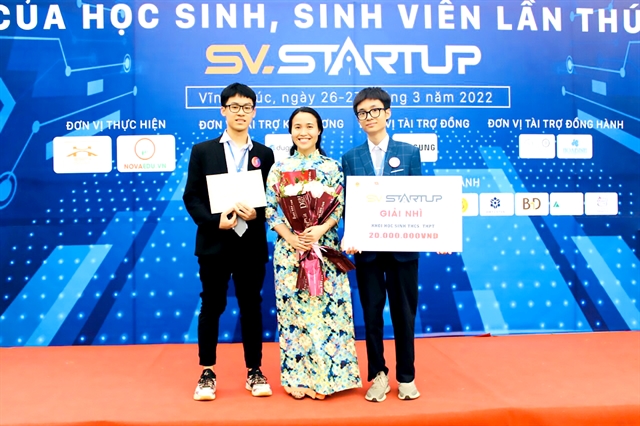 Society
Society

Two 11th grade students have won second prize in a national contest for their project "Signtegrate- communication solution for the deaf in Việt Nam by sign language translation application using artificial intelligence".

|
| Nguyễn Tài Minh (left), Phạm Ninh Giang and their teacher are at the contest. — Photo courtesy of the Hà Nội-Amsterdam High School for Gifted Students |
HÀ NỘI — Two 11th grade students have won second prize in a national contest for their project "Signtegrate – communication solution for the deaf in Việt Nam by sign language translation application using artificial intelligence".
The contest, "Students with startup ideas", was organised by the Ministry of Education and Training.
The project was conducted by a group of students from the Hà Nội-Amsterdam High School for Gifted Students, and the authors of the project are Nguyễn Tài Minh and Phạm Ninh Giang, from grade 11 specialised in maths.
Talking about their idea, Minh said: “The idea originated from my neighbour who has been deaf from a young age. I have had a good relationship with him since we were small and I often act as a tutor for him.
"While interacting and studying together, I see that he faces many communication difficulties and that it affects his confidence and ability to integrate into the community.”
When Minh had received support from teachers and family, he decided to develop the application "Signtegrate", to help the deaf community in Việt Nam to integrate.
“Signtegrate” is a combination of two English words, “sign” and “integrate”, as the project is to help deaf people integrate into the community through sign language.
In the process of researching and developing a startup idea, Minh and Giang faced many difficulties.
“For me, the most difficult thing is data collection, especially during the COVID-19 pandemic, it is very difficult to find and invite experts to provide data for the application,” said Minh.
Minh and Giang learnt sign language to serve the model “Signtegrate”.
“We have overcome all barriers thanks to the support of family, friends and teachers,” Minh said.
While pursuing the idea, the amount of work was large and intense, especially when the competition was about to take place, Minh and Giang were very worried, but both tried their best and had outstanding results.
“On the day of the presentation for the competition, I did not dare to have breakfast and instead spent time reviewing the presentation thoroughly. When talking in front of many people, I was also very nervous and thought I would not be able to complete well, but in the end, we achieved unexpected results, so I am very happy," Minh said.
As for Giang, he said one of the obstacles he encountered was application programming. "Sometimes when programming, we made inevitable mistakes and fixing them was quite difficult."
“I also felt quite pressured because I was worried that our application would not be as good as other products and it would not good enough to convince the judges,” said Giang.
Another obstacle was that Giang was not too knowledgeable about the economy, but only have knowledge of technology. To be able to answer questions from the judges during the presentation, he had to spend a long time practising to gain confidence and be able to convince the board of examiners.
“And after all, the experience I have learned is that when facing pressure, don't be afraid and step out of your comfort zone, try your best for the goal and you will get worthy results," Giang said.
Talking about his future plans, Minh said that he would soon complete “Signtegrate” and find investors to launch it.
The two young people also successfully connected with doctors and potential investors who were the judges at the contest.
"I really hope our future plans will go well so that "Signtegrate" can soon help the deaf community in Việt Nam easily integrate into society," Minh said.
The fourth "Students with startup ideas" contest was launched by the Ministry of Education and Training in July 2021 for students studying at universities, colleges and junior high schools nationwide.
With nearly 400 projects selected to participate, as many as 70, including 50 university students and 20 high school students, have reached the final national round.
The juries are chief executive officers of big companies and corporations. — VNS